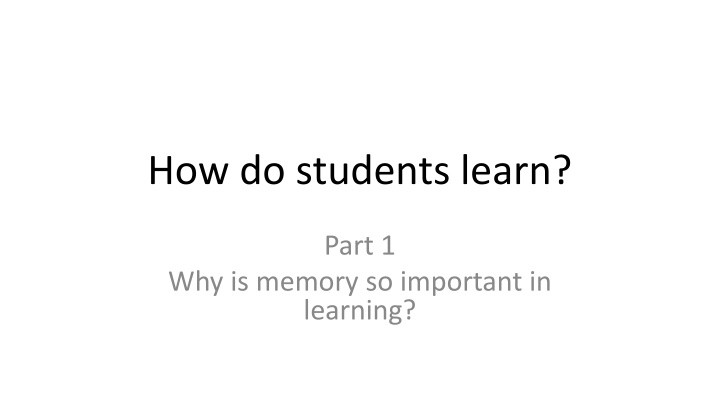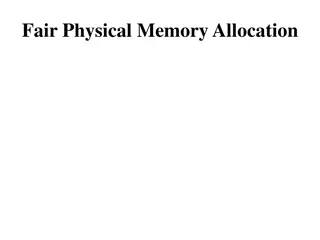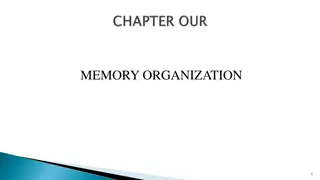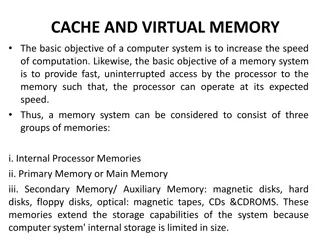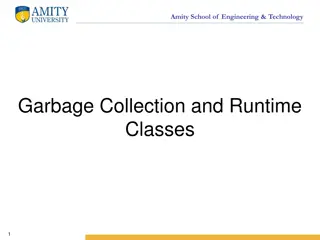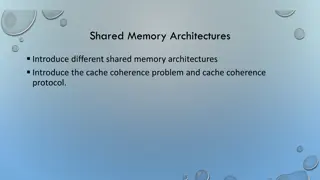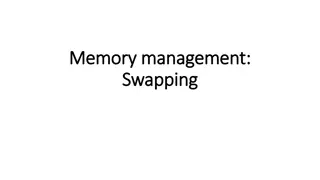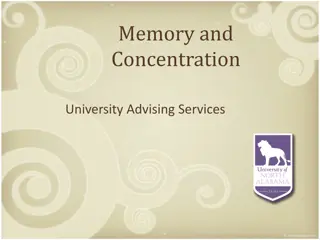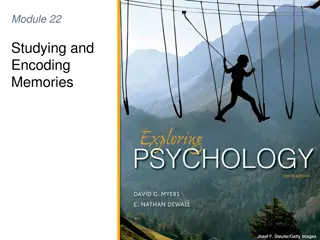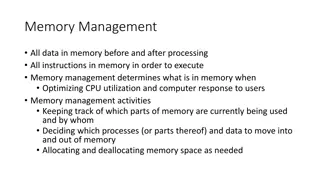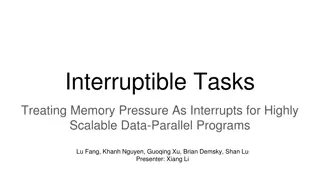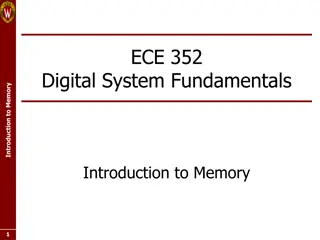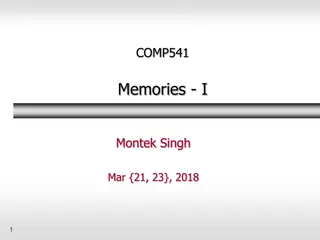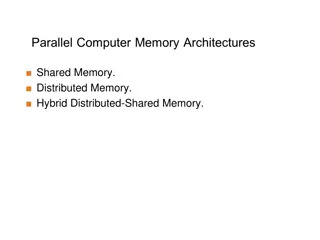Importance of Memory in Learning
Memory plays a crucial role in learning, influencing the acquisition and retention of new knowledge, skills, and behaviors. Understanding how memory works can enhance educational strategies and optimize learning outcomes for students. Research by experts like John Hattie and Gregory Yates emphasizes the significance of prior knowledge in the learning process. Explore the key components of human memory and the impact of memory on educational practices.
Download Presentation

Please find below an Image/Link to download the presentation.
The content on the website is provided AS IS for your information and personal use only. It may not be sold, licensed, or shared on other websites without obtaining consent from the author.If you encounter any issues during the download, it is possible that the publisher has removed the file from their server.
You are allowed to download the files provided on this website for personal or commercial use, subject to the condition that they are used lawfully. All files are the property of their respective owners.
The content on the website is provided AS IS for your information and personal use only. It may not be sold, licensed, or shared on other websites without obtaining consent from the author.
E N D
Presentation Transcript
How do students learn? Part 1 Why is memory so important in learning?
Defined as a change in Knowledge Skills & Attitudes Observable as New Learning Behaviours Stored in Long-term Memory
Professor of Educational Assessment https://twitter.com/dylanwiliam/status/824682504602943489
The most important single factor influencing learning is what the learner already knows John Hattie and Gregory Yates Hattie, John, and Gregory CR Yates. Visible learning and the science of how we learn. Routledge, 2013.
Defined as a change in Knowledge Skills & Attitudes Observable as New Learning Behaviours Stored in Long-term Memory
One part of Teaching Lecturing Facilitates Defined as a change in Knowledge Skills & Attitudes Observable as New Learning Behaviours Stored in Long-term Memory
How do students learn? Part 2 What are the main parts of human memory?
How memory works Image source: https://sites.google.com/view/efratfurst/learning-in-the-brain and Dkahng / CC-BY-SA-4.0
Chunks 67 67 5385 53, 85 5558 555, 8
Memory Test she sells sea shells on the sea shore 3.141952 ? = ? ?2 4?? 2?
The most important single factor influencing learning is what the learner already knows John Hattie and Gregory Yates Hattie, John, and Gregory CR Yates. Visible learning and the science of how we learn. Routledge, 2013.
Memory Test she sells sea shells on the sea shore 3.141952 ? = ? ?2 4?? 2?
How memory works Image source: https://sites.google.com/view/efratfurst/learning-in-the-brain and Dkahng / CC-BY-SA-4.0
Dual coding theory Prior Knowledge Image source: https://sites.google.com/view/efratfurst/learning-in-the-brain and Dkahng / CC-BY-SA-4.0
How do students learn? Part 3 What is the process of storing and retrieving memories?
Defined as a change in Knowledge Skills & Attitudes Observable as New Learning Behaviours Stored in Memory Prior Knowledge Image source: https://sites.google.com/view/efratfurst/learning-in-the-brain and Dkahng / CC-BY-SA-4.0
Remembering Image source: Dkahng / CC-BY-SA-4.0
Change Blindness the importance of attention http://csc.ncsu.edu
Change Blindness the importance of attention https://www.youtube.com/watch?v=vJG698U2Mvo https://www.youtube.com/watch?v=v3iPrBrGSJM Simons, Daniel J., and Michael S. Ambinder. "Change blindness: Theory and consequences." Current directions in psychological science 14.1 (2005): 44-48.
Remembering Image source: Dkahng / CC-BY-SA-4.0
Interference English French English Italian Water Eau Water Acqua Good Bon Good Buono Milk Lait Milk Latte Fish Poisson Fish Pesce
Retrieving long term memories https://sites.google.com/view/efratfurst/learning-in-the-brain
Memory is the residue of thought Daniel T. Willingham Professor of Psychology Willingham, Daniel T. "What will improve a student s memory." American Educator 32.4 (2008): 17-25.
Storing long term memories https://sites.google.com/view/efratfurst/learning-in-the-brain
Metacognitive Questions Why is this fact true? In which situations can I imagine using this knowledge? How is this similar to what I already know?
Remembering Image source: Dkahng / CC-BY-SA-4.0
The importance of context The procedure is actually quite simple. First you arrange things into different groups. Of course, one pile may be sufficient depending on how much there is to do. If you have to go somewhere else due to lack of facilities that is the next step, otherwise you are pretty well set. It is important not to overdo things. That is, it is better to do too few things at once than too many. In the short run this may not seem important but complications can easily arise. A mistake can be expensive as well. At first the whole procedure will seem complicated. Soon, however, it will become just another facet of life. It is difficult to foresee any end to the necessity for this task in the immediate future, but then one never can tell, After the procedure is completed one arranges the materials into different groups again. Then they can be put into their appropriate places. Eventually they will be used once more and the whole cycle will then have to be repeated. However, that is part of life Bransford, John D., and Marcia K. Johnson. "Contextual prerequisites for understanding: Some investigations of comprehension and recall." Journal of verbal learning and verbal behavior 11.6 (1972): 717-726.
Memory Test EFA TOW LAT EHI SHA TTE
Memory Test The importance of structure EFA TOW LAT EHI SHA TTH THE FAT OWL ATE HIS HAT
The importance of structure List the months of the year in alphabetical order
How do students learn? Part 4 How does knowing facts lead to understanding?
SOLO Taxonomy Image source: Doug Belshaw / CC-0-1.0
SOLO Taxonomy Mental Models Schemata Facts, Ideas Image source: https://sites.google.com/view/efratfurst/learning-in-the-brain and Doug Belshaw / CC-0-1.0
How do students learn? Part 5 What determines our speed of learning?
Memory is the residue of thought Daniel T. Willingham Professor of Psychology Willingham, Daniel T. "What will improve a student s memory." American Educator 32.4 (2008): 17-25.
Which are active learning? Sitting in lecture Taking notes in a lecture Group work Solving question sheets Group discussion
Learning speed prior time focus knowledge
Learning speed conscientiousness prior time focus knowledge IQ
Learning speed motivation prior time focus sequence prime knowledge distractions, scaffolding
How do students learn? Part 6 What is Cognitive Load theory?
Professor of Educational Assessment https://twitter.com/dylanwiliam/status/824682504602943489
Cognitive load theory Complexity of the activity Elements unrelated to the problem Complexity of the instruction
Zone of Proximal Development Complexity of the activity Prior knowledge Image source: Awan, et al. "Making learning fun: gaming in radiology education."(2019)
How do students learn? Part 7 What effects our motivation?
https://procrastinus.com/piers-steel/theories-of-procrastination/https://procrastinus.com/piers-steel/theories-of-procrastination/
How do students learn? Part 8 Summary
Questions Why is memory so important in learning? What are the main parts of human memory? What is the process (and errors) of storing and retrieving memories? How does knowing facts lead to understanding? What determines our speed of learning? What is Cognitive Load theory? What effects our motivation?
